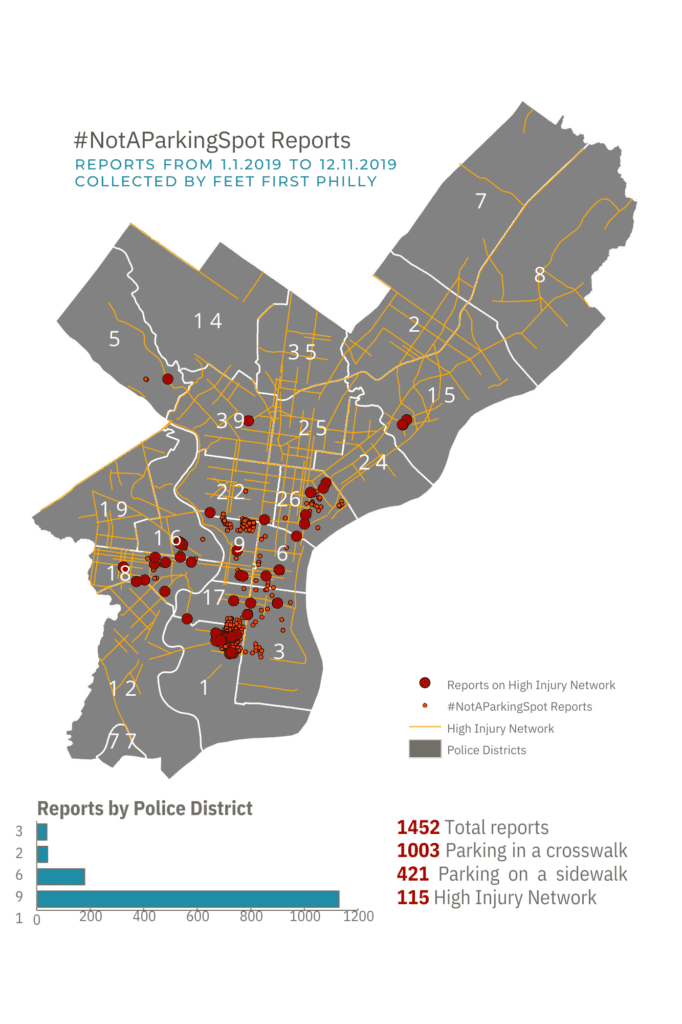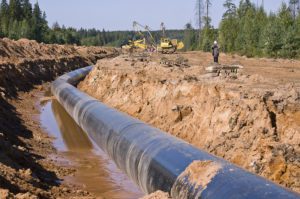Since 2017, Feet First Philly (FFP) has been documenting illegal parking on sidewalks, crosswalks, curb cuts, and bike lanes. Through their #NotAParkingSpot Twitter (now X) campaign, FFP has drawn attention to this issue for many years. Finally, we are excited to announce that the Philadelphia Parking Authority is planning to crack down on illegal parking that blocks crosswalks and sidewalks, inhibiting the mobility of and creating safety issues for pedestrians all over Philadelphia.
Over the years, FFP received thousands of reports of illegal parking, and has documented them, forwarded individual reports to the appropriate Police districts and the Parking Authority, and generated maps to show the extent of this problem. Until now the problem has never been a priority for enforcement agencies and the dangerous behavior has gone largely unchecked.

Now that the PPA is cracking down on illegal parking, they and their partner Variety will officially announce in mid-April the new program the “Mobility and Access Initiative” to the public. This new program will draw more attention to the issues that result from illegal parking. Hiring more enforcement officers is needed to get this program running, and we applaud the Philadelphia Parking Authority for committing to hiring 30 new enforcement officers to focus on vehicles illegally parked on sidewalks and blocking ADA-accessible curbs. Enforcement will begin in May, therefore providing a warning period of approximately four weeks after the official announcement.
Community members are aware of the issues created by illegal parking and have used Feet First Philly’s Public Space Enhancement Mini-grant program to help resolve them in their neighborhoods. For example, Friends of Adaire used funds from the Public Space Enhancement Mini-grant program to install planters and bike racks along the sidewalks of Earl Street and Palmer Street to prevent illegal parking and protect children and parents walking to and from school.
Illegal parking greatly affects pedestrians, with an even greater impact on vulnerable populations including people with disabilities, older adults, and children. With this new enforcement program in place, we hope to see a shift in culture from one that has allowed illegal parking to be pervasive in our city for so long to a place where pedestrians of all ages and mobilities can travel safely.

PENNSYLVANIA (February 27, 2024) – On Saturday, the Pennsylvania Department of Environmental Protection (DEP) published the final guidance on using underground boring technology (“trenchless” technology) such as horizontal directional drilling (HDD) to build gas pipelines and other underground utilities. The guidance lays out a roadmap to less-risky pipeline construction practices. The guidance stems from a legal appeal of Mariner East II pipeline permits by Clean Air Council, Delaware Riverkeeper Network, and Mountain Watershed Association.
Also announced last week, the Pennsylvania Public Utility Commission (PUC) released a final rulemaking intended to improve safety in the construction and operation of pipelines, such as the Mariner East lines, transporting hazardous liquids through Pennsylvania. Hazardous liquids pipelines will now be subject to Pennsylvania-specific regulations as well as federal Pipeline and Hazardous Materials Safety Administration (PHMSA) regulations. These new regulations come after an in-depth review of pipeline safety measures in Pennsylvania, prompted in part by a lawsuit filed by residents before the PUC. The “Safety 7” lawsuit alleged that the safety risks associated with the Mariner East pipelines violated residents’ rights. Clean Air Council filed as an intervenor in safety-related cases before the PUC, and supported residents in their advocacy efforts to gain greater public safety protections. The new regulatory framework corrects some of the prior loopholes and lessens the risks to residents of the Commonwealth.
“DEP’s trenchless technology guidance and the PUC’s hazardous liquids safety rule are some of the strongest and most protective in the country when it comes to safeguarding the public and the environment,” said Alex Bomstein, Clean Air Council Legal Director. “Our commonwealth is overdue for these protections as fracking runs rampant and the industry clamors for more pipelines for transport. The Council will continue to watchdog the gas industry and ensure that these rules are followed and the public is protected.”
“Because Mariner East largely does not transport gas for energy production but “natural gas liquids,” which are used mostly for plastic production, it fell outside of many of the rules governing gas lines,” said Melissa Marshall, Mountain Watershed Association Community Advocate. “This lack of oversight caused countless harms and we hope this guidance will prevent such catastrophic damage in the future.”
Delaware County resident Rosemary Fuller, who was involved in the Safety 7 case, stated that, “hazardous liquid pipelines put residents at risk, especially when they run through densely populated areas, next to schools and hospitals, or through areas where residents source their drinking water from private wells, which are impacted by HDD drilling. The DEP and PUC rulemaking is long overdue, and these new regulations must be strictly enforced.”
The latest spill on the Mariner East pipeline system was reported this week in Marsh Creek State Park in Chester County where drilling fluid used during construction of the pipeline once again rose up in a wetland and flowed into a tributary to Marsh Creek Lake.
“This is just one example of how the damage to the environment doesn’t end when the drilling ends,” said Chester County resident Christina DiGiulio, “these corporations need to be held fully responsible for their crimes.”

